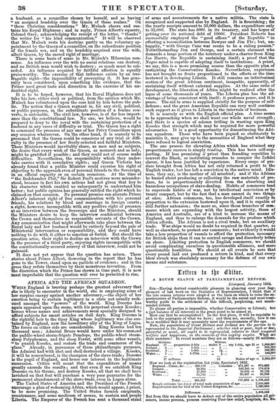AFRICA AND THE AFRICAN SQUADRON.
WErre England is braving perhaps the greatest adversary that she is likely to encounter in the world, she is employing some of her surplus energy against another adversary,—the object of her exertion being to sustain legitimacy in a state not usually reek- -oiled amongst the " powers" of the world. King Docemo has again appeared upon the scene, with his perpetual enemy Kosoko ; heroes whose names and achievements seem specially designed to afford subjects for smart articles on dull days. King Docemo is the rightful heir to the tipsy King whose legitimacy was also sus- tained by England, now the hereditary ally of the King of Lagos. The forces on either side are considerable. King Kosoko had ten 'thousand men ; Admiral Bruce would have under his'command the paddle-wheel steam-frigate Penelope, the paddle-wheel steam- sloop Polyphemus, and the sloop Ferret, with some other vessels, "to punish Kosoko, and restore the trade and commerce of the -place." Already, in pursuance of these philanthropic purposes, the Admiral had with shot and shell destroyed a village. Kosoko, it will be remembered, is the champion of the slave-trade ; Docemo is-the pupil of England, and hence our interest in the legitimate succession. Critics will count that the expenditure of means --greatly exceeds the results ; and that even if we establish King Docemo on his throne, and destroy Kosoko, all that we shall have lavished on that feat will purchase a very poor guarantee for the -permanent abandonment of the slave-trade, even in Lagos alone.
The United States of America and the President of the French encourage a plan of redeeming Africa, which would appear, a priori, 'to be more promising. The United States furnish emigrants, countenance, and some modicum of means, to sustain and people 'Liberia. The Emperor of the French has lent a thousand stand
of arms and accoutrements for a native militia. The state is recognized and supported also by England. It is flourishing; far the yearly receipts amount to 35,000 dollars, the expenditure only to 32,000. The state has 500/. in its treasury, and has hopes of getting over its national debt of 1000/. President Roberts has successfully employed the "good offices" of the Republic "in effecting a reconciliation between Bowyer and Jim Flo ; but, un- happily, "with George Cane war seems to be a ruling passion:" Notwithstanding Jim and George and a certain claimant who demands a large portion of the territory under a charter from King Joe Harris, the Republic is sustaining itself; a proof that the Negro mind is capable of adapting itself to institutions. A priori, we say, this is a more promising course than the opposite plan of castigating the Conservative Kosoko. Nevertheless, experience has not brought us fruits proportioned to the efforts or the time bestowed in developing Liberia. It still remains an infinitesimal section of the great African continent, incapable, apparently, of sustaining itself without external supplies. At the same ratio of development, the liberation of Africa might be realized after the lapse of some thousands of years. The Liberia plan has the ad- vantage of being consistent with itself ; it professes peace, and it is peace. The aid in arms is supplied strictly for the purpose of self- defence ; and the great American Republic can very well oontinue such support as it gives to Liberia in the intervals of business. It is scarcely so with the English official plan. A time seems to be approaching when we shall want our whole naval strength ; and there is a species of solemn trifling in wasting upon -Mug Kosoko that strength which may be required for more powerful adversaries. It is a good opportunity for discontinuing the Afri- can squadron. Those who have been piqued so obstinately to maintain it, may give up to the necessities of England what they have refused to logical conviction. The one process for elevating Africa which has attained any proportionate success is simply trading. This has been self-sup- porting. If less promising k' priori than founding republics to convert the Black, or instituting crusades to conquer the Infidel slaver, it has been justified by experience. Every cargo of pro- duce brought from Africa has not only returned a profit to the English trader, but has left a conviction in the native mind. Idle- ness, they say, is the mother of all mischief; and if the African be busied about producing or collecting the raw materials of pro- duce, he is proportionately diverted from the absorbing and hazardous occupations of -slave-dealing. Habits of commerce tend to supersede habits of war, not by intellectual conviction or by treaty compact, but by the fact that a man cannot do two things at once. African commerce, too, has developed itself exactly in proportion to the extension bestowed upon it, and it is capable of still further extension ; the more so, since those branches of com- merce which are expanding with the largest activity, these of America and Australia, are of a kind to increase the means of England, and thus to enlarge the demands for the produce which Africa affords. The African is not a rival trade, but an auxiliary trade. War-ships would no doubt be required in that quarter, as well as elsewhere, to protect our commerce ; but evidently it would take a less proportion of vessels to afford the protection necessary for British ships than it can to control savage and disorderly tribes on shore. Limiting protection to English commerce, we should avoid complicating ourselves in questionable alliances, and more questionable hostilities. We should at all events be sure that every pound laid out produced a return in kind, and that every blow struck was absolutely necessary for the defence of our own means and substance.


























 Previous page
Previous page